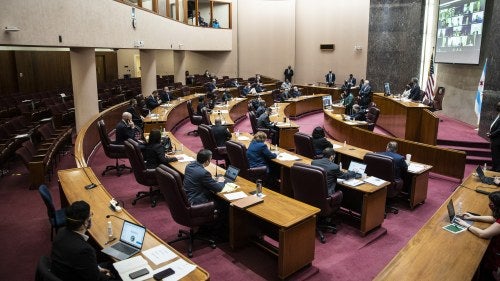From Ukraine to Gaza to Iraq, Chicago's city council has been voting more often on foreign affairs

City Council legislation on foreign policy tripled in the chamber in the last four years, according to a ChicagoGlobal analysis.
The Chicago City Council has been weighing in on foreign affairs more often in the last four years, and the trend is on pace to continue. ChicagoGlobal’s data-driven analysis found that at least 30 pieces of legislation related to international affairs had come before the City Council in the last four years, including expressions of support for Ukraine after Russia’s full-scale invasion, opposition to U.S. military activities in Iraq, and a call to end the U.S. embargo against Cuba.
While just four foreign policy items came before the Council in 2020, that tripled in 2023 to 12 pieces of legislation. One month into 2024, when we conducted our analysis, the chamber was set to continue the trend, having already considered two resolutions on global affairs, including a resolution calling for a cease-fire in Gaza that passed after a tie-breaking vote from the mayor. In floor discussion on the Gaza cease-fire, alderpeople debated whether votes on foreign affairs have an impact on global events, and whether the legislation matters to the people of Chicago. Though there was disagreement among council members, some business owners say the local impact is undeniable.
Forty years of foreign affairs at City Hall
This new pattern is part of a long tradition of voting on foreign affairs.
Forty years ago, Chicago City Council voted to “condemn the illegal and immoral system known as apartheid” in South Africa and later restricted South African investments. In 2003, just before the start of the war, the Council expressed its opposition to a preemptive attack on Iraq. The resolution said that Iraq’s then-leader Saddam Hussein “should be removed from power” but that “war in Iraq would compromise our current action in Afghanistan and require years of nation-building activities in Iraq.”
To be clear, foreign affairs are still an extremely small percentage of the legislature's docket.
Since 2020, the chamber has considered over 33,000 matters: over 8,000 each in 2020 and 2021, and about 7,000 each in 2022 and 2023. Those related to global affairs accounted for just 0.1% of the Council’s business. In comparison, during the same period that the City Council voted on 31 global affairs resolutions, they also voted on 793 awning approvals for businesses and over 3,000 individual happy birthday wishes.
Most pieces of legislation related to foreign affairs are approved: only about 1 in 5 failed to pass the City Council. These included a call for Poland’s government to protect independent media, a commemoration of the City Council’s Taiwan Friendship Caucus, a condemnation of caste discrimination in India, and an expression of opposition to U.S. military action in Iran and Iraq in 2020.
An effort to revoke Moscow’s status as a sister city had majority support, but was superseded when Mayor Lori Lightfoot’s office severed the relationship.
ChicagoGlobal also found at least 11 items related to immigration, but we excluded them from the final count. While this kind of legislation has a clear connection to global affairs, the proposals often calls for domestic policy changes or address Chicago’s local response to the recent influx of asylum seekers.
What are the types of City Council legislation on foreign policy?
In some cases, City Council uses its jurisdictional control to influence international affairs by redirecting spending, as when it joined anti-apartheid efforts and started divesting from South Africa.
More often, the chamber uses the levers of local control to symbolically memorialize global events or signal its beliefs. In 2023, for example, the Council voted to advance an ordinance that would create an honorary street for “May 3rd Polish Constitution Way.” It has also designated dates to mark international Holocaust remembrance, the 1995 Srebrenica genocide in the Bosnian War, victims of the international slave trade, and the 120th anniversary of diplomatic relations between the U.S. and Bulgaria.
Finally, legislation can express the City Council’s opinion without enacting policy changes. The text of these resolutions can include language that specifies how and why the City Council thinks a particular international issue is connected to Chicagoans’ lives.
In 2022, for example, the City Council voted 46-1 to embrace UN treaties prohibiting nuclear weapons and urge the U.S. government to prioritize nuclear disarmament. The resolution estimated that “Chicago residents contribute more than $500 million annually to nuclear weapons through Federal taxes” and called on the federal government to “cease spending Chicagoans’ Federal tax dollars on nuclear weapons.”
What impact does the Council’s legislation on foreign affairs have abroad and at home?
Though some alderpeople expressed concerns that legislation from an American municipal council would have no impact on global affairs or their wards, Ukrainian business owners in Chicago say that the City Council’s resolutions on Ukraine have made a difference, but that their impact has waned as the war wears on.
The Council has introduced a number of resolutions pertaining to the Russia-Ukraine conflict, including one in January calling on Congress to provide more military support to Ukraine. Though that resolution is still awaiting a vote, the owner of Tryzub Ukrainian Kitchen in Ukrainian Village says that this kind of City Council legislation has a real impact on their lives.
After Russia’s full-scale invasion two years ago, Tryzub saw an outpouring of support and more customers coming through the door. That’s since subsided.
Tryzub’s owner, Myron Lewyckyj, told ChicagoGlobal that he felt it was “very important that City Council acknowledge support for Ukraine and support for weapons for Ukraine’s fight for freedom.”
The restaurant’s mission, he said, is to help Chicagoans get to know Ukraine’s culture and history. “Everything that raises awareness of the plight of Ukraine also stimulates our business, and the more customers [we have], the more we can turn their attention to aid Ukraine,” Lewyckyj said.
In addition, he said that City Council legislation helped counteract Russian misinformation.
“It’s important that official statements represent the truth,” Lewyckyj said.

In October 2023, James Beard Award-winning Chef Johnny Clark opened Anelya (pictured left), a Ukrainian restaurant named after Clark’s Ukrainian grandmother who survived both the Holodomor and three years of forced labor under the Nazis before moving to the Midwest.
When Russia invaded Ukraine in 2022, Clark said there was a wave of support for Ukrainian businesses. “You would see lines out the door at Ukrainian restaurants,” he said, citing Tryzub as one example.
He said resolutions from the City Council supporting Ukraine were more impactful when the full-scale invasion first began.
“[At] most Ukrainian businesses that [support] has died down,” he added, citing war fatigue.
To make an impact, a City Council resolution “would have to somehow reach the general public, and I think that a lot of these things don’t reach the general public.”
“I think any support is good support,” Clark said. “Politically, does it have an impact? I have no idea.”
This story first appeared in the ChicagoGlobal newsletter, a joint project of Crain's Chicago Business and the Chicago Council on Global Affairs.
ChicagoGlobal collected 35,000 pieces of Chicago City Council legislation from Chicago Councilmatic’s online portal dated between November 13, 2019 and January 31st, 2024. Using a list of filter words for common resolutions that are unlikely to be related to global affairs, we pared down the larger list to a small subset of about 1,050 items. Next, we manually tagged any legislation in this list that seemed likely to be related to foreign affairs based on its title.
Determining what is and isn’t related to foreign affairs isn’t an exact science. Generally, we included legislation that had a clear tie to U.S. foreign policy or another country’s domestic politics. The trickiest decision here was whether or not to include the dozen or so pieces of City Council legislation on immigration. Ultimately, we think that the majority of resolutions on immigration are primarily focused on domestic U.S. policy, so we’ve left them off the final list.
Using a list of filter words to sieve out legislation has lots of advantages: it’s a quick and efficient way to discard noise. The downside is we may unwittingly be undercounting resolutions that do fit our criteria. A perfect count would have analyzed each legislation's text in addition to its title, but, in the absence of the time and resources for such an analysis, we are confident that our count captures at least the most clearly relevant legislation.
| Title | Sub. Status |
|---|---|
| Commemoration of Human Rights Day | Adopted |
| Affirmation of City's Support for Independence, Sovereignty and Territorial Integrity of Ukraine | Adopted |
| Call for End to U.S. Embargo Against Cuban Trade and Travel | Adopted |
| Call for Polish Government to Reject Proposed Legislation Threatening Free and Independent Media and Democracy in Poland | Failed to Pass |
| Call for Special City Council Meeting on October 13, 2023 at 1:40 p.m. to Consider Resolution Condemning Hamas' Attack on Israel | Placed on File |
| Call for U.S. President Biden to Facilitate De-escalation of Ongoing Violence in Middle East and Provide Humanitarian Assistance | Referred |
| Call for United States Government to Cease Spending Federal Tax Dollars on Nuclear Weapons, Embrace United Nations Treaty on Prohibition of Nuclear Weapons, and Make Global Nuclear Disarmament Main Focus of National Security Policy | Adopted |
| Call on U.S. President Biden and U.S. Department of Homeland Security to Designate, Re-designate or Extend Designation of Various Countries for Temporary Protected Status and Expand Eligibility Opportunities | Referred |
| Call on U.S. President Biden to Call for and Facilitate Peace in Middle East and Provide for Increased Humanitarian Assistance | Referred |
| Commemoration of 120th Anniversary of Establishment of Diplomatic Relations Between United States and Bulgaria | Adopted |
| Commemoration of Formation of Chicago City Council Taiwan Friendship Caucus | Failed to Pass |
| Commemoration of Holocaust Remembrance Day | Passed |
| Condemnation of Hamas Attack on Israel | Adopted |
| Declaration of August as "Parliament of World's Religions Month" in Chicago | Adopted |
| Declaration of July 11, 2023 as "Srebrenica Genocide Remembrance Day" in Chicago | Adopted |
| Expression of Opposition to U.S. Military Attack in Iran and Increased Military Engagement in Iraq | Failed to Pass |
| Expression of Support for People of Ukraine and Call for U.S. Congress to Approve Funding for Continued Provisions of Defense Systems | Referred |
| Expression of Support for United Nations Resolution 377 known as "Uniting for Peace" | Adopted as Substitute |
| Honorary Street Designation as "May 3rd Polish Constitution Way" | Council Introduction |
| Reaffirmation of Chicago's Status as Welcoming City and Sanctuary for Refugees Fleeing Violence in Ukraine | Failed to Pass |
| Recognition of 21st Anniversary of International Day of Remembrance for Victims of Slavery and Transatlantic Slave Trade | Adopted |
| Recognition of Historical and Cultural Significance of Norooz, Iranian New Year | Failed to Pass |
| Recognition of India's 72nd Anniversary of Republic Day and Call for Condemnation of Violence Against Certain Castes and Faith Groups | Failed to Pass |
| Renaming of Woodard Plaza as "Solidarity Triangle” | Adopted |
| Recognition of January 27, 2022 as International Holocaust Remembrance Day | Adopted |
| Recognition of January 27, 2024 as International Holocaust Remembrance Day | Adopted |
| Recognition of Save Our Allies' Rescue of Fox News Correspondent Benjamin Hall from Ukraine | Adopted |
| Resolution Condemning Gender-Based Violence in Afghanistan | Adopted |
| Revocation of Moscow, Russia's Sister City Status in Chicago Sister Cities Program | Failed to Pass |
| Support of Human Rights Movement in Iran | Adopted |

